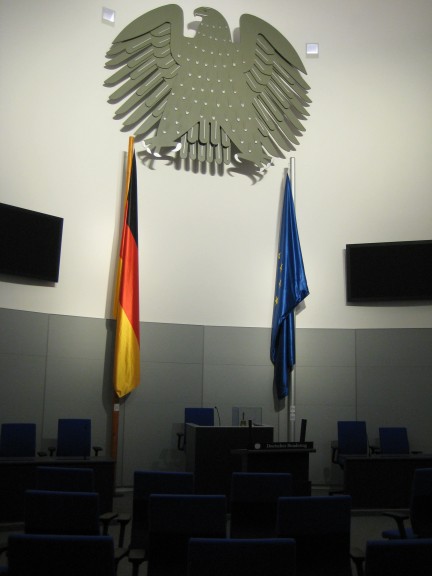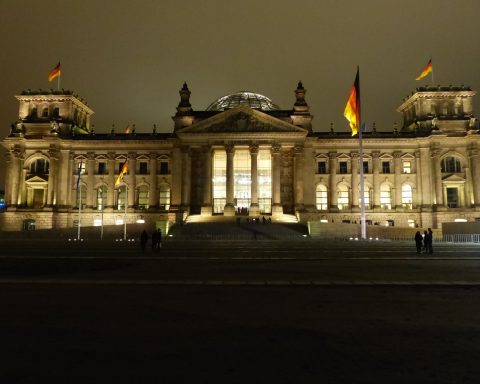I have followed German federal politics since I was about six years old, but yesterday’s elections have produced the most shocking results that I have seen in my lifetime. While the landslide defeat of the SPD and the huge losses of Merkel’s CDU would give me more than enough to write about, the significance of these results pale in comparison to the 12,6% attained by the right-wing AfD.
In fact, for the first time since 1949, a party that is more right-wing than the CDU enters the Bundestag.
In Saxony, the AfD became the strongest party, winning over 27% of the vote. But we shouldn’t despair. Yes, some of the AfD’s voters are racists, but these racists were around well before the AfD even existed.
Instead of calling everyone names, I think we should read these results as a wake-up call – we need to wake up to the fact that large parts of our population are ostracised. And the left, in particular, needs to find an agenda that truly addresses the concerns of these people.

In this short opinion piece, I want to address three causes of the AfD’s rise.
(1) Firstly, for the past 30 years, politicians of all parties have failed to take seriously the demise of small and medium sized enterprises in rural and suburban areas. As I have pointed out in a previous piece, Handwerk forms the backbone of rural life in Germany. Apart from providing basic services such as bakeries, butcheries, plumbers and electricians, Handwerk enterprises provide lots of decentralised jobs for well-educated youngsters.
In Saxony alone, over 300,000 people work in Handwerk businesses, although this number is declining. While there continues to be demand for bread, meat and electricians, these services are being centralised in large industrial companies, whose headquarters are usually based around major cities, forcing young people out of rural areas and towards the urban centres.
Those who remain reminisce about the past and lament the exodus of youngsters.
German governments have continuously supported industrial companies rather than Handwerk businesses. German and EU regulations clearly favour companies with lots of staff.
While the digital revolution makes life easier for industrial companies, the changes imposed are hard to implement for small companies. On top of that, the type of work that industrial companies offer is often alienating and ungratifying – the skills acquired during vocational training (Ausbildung) become obsolete and most of the tasks undertaken in factories can be learned within a couple of days.
Salaries remain low and the standard of living for rural populations is stagnant or declining. In light of those circumstances, it becomes understandable why people are looking for an alternative to the dominant parties.
(2) The second point I want to address is closely related to the first, as it also addresses the problems faced by those living in rural areas. The declining business opportunities in rural areas as well as the automatization of agriculture have led to the increasing obsolescence of rural infrastructure.
When I was a child, there was a Mittelschule in my village and a Gymnasium in the village next to it. By the time I was ten, both had disappeared. There was a small town hall in every single one of the surrounding villages, but as a result of a municipal reform during the 1990s, the local administrations became centralised.
The office of the local police officer was abolished in favour of police headquarters in Leipzig. I used to go to a small grocery store in my neighbourhood; but by 1995, it had shut down due to competition from a nearby shopping mall.
We knew the family of the shop keeper, and they knew ours. These interactions were replaced by the reifying exchanges at the supermarket.
I haven’t even mentioned public transport yet. If you live in a small village, it has become nearly impossible to commute to work using a bus. While politicians have continuously promised to do something about these developments, voters were usually left disappointed.
To give a voice to their dismay, many have now voted for the AfD.
(3) The third point I want to emphasise concerns globalisation and its side effects. A few months ago, I heard about a survey that claimed that many people in Germany view globalisation as a threat, especially those with lower levels of education.
First of all, I am tired of the argument that someone who has studied political science supposedly has a higher level of education than someone who has done vocational training as a car mechanic. Moreover, if you own a small bakery that delivers bread to a local hospital, and if that same hospital cancels your contract because they found an industrial company in Poland that makes that bread for half the price, globalisation is not a threat, but its spillover is bitter reality.
The left has failed to demarcate the negative side effects of globalisation, not only for the global poor, but for local Handwerk and agriculture.
The naïve and undifferentiated appraisal of open borders, freedom of movement and cosmopolitanism seems like a slap in the face for those who had to shut down their businesses due to competition from abroad. Unfortunately, the left has left it to parties like the AfD to acknowledge that globalisation is not all beneficial.
I don’t know how to defeat the AfD, but I have the feeling that calling them Nazis is not going to help, as this will further deflect from the real issues at stake. We may need to take some of the things they are arguing seriously, which may result in channelling people’s frustration towards a productive political process, rather than against refugees and immigrants.
Perhaps what is needed in Germany is a “national grand effort” (aka Merkel’s “nationale Kraftanstrengung”) for rural areas as well as for refugees. One thing is certain: If we pretend as though the AfD is about xenophobic East Germans, the right wing is only going to rise further.









